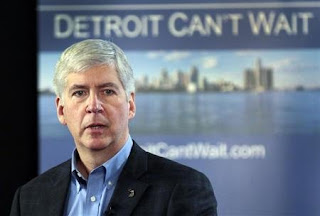After a testy exchange between the judge presiding over Detroit's bankruptcy and a Michigan official, attorneys for the state agreed on Tuesday to drop a challenge to a request by creditors' lawyers to depose Governor Rick Snyder on the city's eligibility for bankruptcy.
Citing executive privilege, the office of the state attorney general had filed a motion late Monday arguing Snyder should not be deposed. Creditors' attorneys had said they wanted the governor's deposition to determine his motivation in approving a request in mid-July from Detroit's state-appointed emergency manager, Kevyn Orr, to take the city into Chapter 9 bankruptcy.
If Detroit's bankruptcy goes ahead, it will be the largest municipal bankruptcy in U.S. history. The city owes some $18.5 billion in long-term debt, and public sector unions have challenged the bankruptcy filing on grounds that it violates protections for worker pensions and benefits enshrined in Michigan's constitution.
Some unions have also argued in filings that Snyder and Orr arranged the bankruptcy filing specifically to target worker pay and benefits.
Clearly annoyed, U.S. bankruptcy Judge Steven Rhodes took issue with the lateness of the filing on Monday and said he had half a mind to waive the Tuesday hearing.
Assistant state Attorney General Margaret Nelson, who appeared in court to make the governor's case, argued that the issue of deliberations on Snyder's part were not relevant to the case.
But Judge Rhodes responded that as creditors had objected to the bankruptcy based in part on Snyder's motives, it was too late to cite executive privilege.
"It's hard for me to imagine what you thought they were going to ask the governor in a deposition other than that," the judge said. "That has been clear from the start."
"What else is there to ask him about?"







.jpg)






.jpg)

0 comments:
Post a Comment